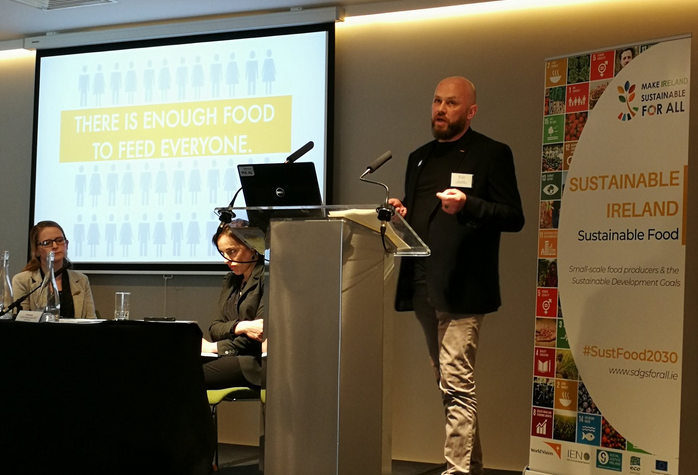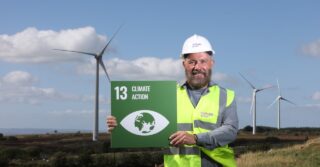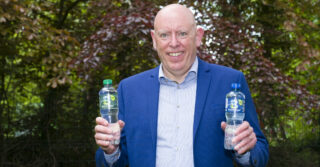Sustainable Food for All and the SDGs: Alternative Perspectives from the Fringe
 Our CSR Adviser Johnny Meehan recently attended the Sustainable Ireland – Sustainable Food Conference in Croke Park on the 11th of April. Johnny shares a summary from the day.
Our CSR Adviser Johnny Meehan recently attended the Sustainable Ireland – Sustainable Food Conference in Croke Park on the 11th of April. Johnny shares a summary from the day.
I discovered some interesting and alternative perspectives on food that really resonated with me, maybe they will with you too.
Insights for you
The global context and evidence for lack of diversity in all agricultural models was that 75% of the world’s food comes from just 12 plants and 5 animal species. This means that we are all overly dependent on mountains of the same stuff grown intensively each year, and yet a third of it goes to waste, for example we dump 1M. MTs of food in Ireland alone every year. At the same time globally 1Bn people are hungry and live in abject poverty. Just three crops (rice, maize, wheat) pretty much feed the world and within these food family groups we rely on just a handful of seed varieties which are owned by a few mega-corps. In addition, we are beginning to see the destructive long-term effects of relying on industrial chemicals to boost crop yields, which is impacting our capacity for survival by destroying our living soils, water bodies, and pollinating insects. Heavy!
The industrial model of production has been ultra-successful in feeding most of us. It is built on linear models of simplicity and specialisation, scale and mechanisation, and is focused on driving efficiencies up and costs down. But monocultures dominate now, while diversity has suffered. In Ireland, we were reminded that we see specialisation across our country which is covered in grass, with lots of standard issue cows and sheep outside in our temperate maritime climate. There’s a predictable sameness about it all. These are our familiar visible figures in the Irish landscape, and we have shaped them and our landscape with our choices. In the process however I heard that we have lost much of our biological diversity and native woodlands. Gone too are so many family farms that used to produce much of the food for local communities. While we are huge exporters of milk powder and meat, we are huge importers of grains, vegetables, fruits, and all our other food including much of our bread.
We lack food sovereignty and resilience, and have become food-dependant
In the room, farmers told us that they can grow most of this imported food locally using simple and sustainable technology and can produce it at a fair price. A common view was that the oft-used argument of prohibitive cost or price was a fallacy given inflation in the cost of expensive imported farm inputs in the current model, and escalating supply chain costs in global supply lines. Small-holder producers spoke of making small margins on meat and milk and how they are trapped in a system of dependency. Average farm incomes remain low, and the farmer who wants to break free and reinvent her farm is doing so at great risk.
The alternative message at this event was that everything must change: our mind-sets; production models; and consumption models with more support for local produce. The EU Common Agricultural Policy was seen as needing radical change too with a different farm payment in addition to provisions in the SFP to further reward sustainable practices and innovation. The new All of Government Plan for Ireland on Climate Action was singled out as requiring policy coherence and that it should be owned by An Taoiseach Leo if it is going to work. We heard of the need to address inequality and gender imbalance because we need more women farmers.
The small-holder producer can be a powerful role model in helping Ireland deliver on the SDGs
Our co-operative model and community meitheal was regarded as transformative in bringing people together to share their craft and resources, in SDG terms this represents Partnership for the Goals (SDG17). This model still works, and we were shown how it is working in the developing world. A case was also made to bring the lessons of Fair Trade home so that the farmer is paid a fair premium for innovation and quality, and as a way to forge a more direct connection between growers and consumers (i.e. cut out the middle-man). The case was made for the organic sector which we heard has received no support from Government, and is still only 1%-2% of the market whereas in Europe the average is 7% and in Sweden it is 20% (why is it always Sweden?). We learned that farmers are not eating the food they are producing. While in contrast, chefs have started their own movement to create nutritious wholesome food using locally grown seasonal produce under The Chef’s Manifesto and support for this movement is growing across a network of restaurants. Interestingly, the case was put forward to create our own model of appellation controlees (A.C.s, as in French wine regions) and begin to differentiate produce by region (think “the Wild Atlantic Way” A.C for organic produce from Co. Clare) where we trade more on our provenance. What is Irish terroir? Anybody?
In the end, there were pleas about conservation farming and promoting family farming; and a notable call for a new vision of a viable future for diversified sustainable agriculture with the important proviso that there must be clear and detailed pathways about how to get to outcomes that deliver the SDGs.
This is about sustainability choices not challenges
Sustainability in Ireland was not regarded as a challenge because we have everything we need to fix what was seen as a broken model, rather we are making choices about sustainability. There was clear support in the room for implementing the Citizen’s Assembly recommendations on Climate Action, those from the Joint Oireachtas Committee, and the work of An Taisce (the Irish National Trust) received warm praise. We were reminded that many farmers recognise the need for change.
Create an ecosystem of support beyond food
One powerful insight really stood out for me, the idea that we need social protection measures first in order to create an ecosystem of support beyond food that creates hope for farmers who want to grow nutrient dense food for citizens in their communities. This will require a new perspective and policies from the EU and Irish Government, to switch their attention and bundle of supports and tax-breaks they currently give to business, to smaller businesses and entrepreneurs in cities or in villages or on farms which create so much value locally. I heard that the problem is that we just lack the will to do so, and that we all need to be educated about our food.
A personal view
SDG 17 is so significant and possibly the most important Global Goal of all because we need better partnerships and collaboration for sustainability in order to achieve ALL of the SDGs. No one company or sector can transform the system, and systems always push back. Recently the UN Global Compact called for a “strategic pivot” towards transformational partnerships with scalable impact as the best way to achieve the SDGs by 2030.
I do agree that there is a role for Government as it is already in the business of agriculture and what is required is policy coherence to ensure that all Departments are being consistent in their work. I think the rise of the conscious consumer is an important development and bodes well for the emergence of strong local markets for farmers where they can earn a premium or fair price. As an example of success, just look at what Riverford have done in the UK to make a market. But in order to kick-start a new model the incentives and supports must be installed first in order to provide farmers with some stability, after all the crop cycle and farm management requires longer-term planning, and many farmers are already over-burdened with debt. The Government knows that the Irish economy needs to diversify, this applies as much to our over-reliance on FDI and income from a handful of U.S. multinationals, as it does to our reliance on export markets for meat and milk (we have already placed our bets on the rise of demand in China).
We need balance, social inclusion, diversity, and a just transition to a more meaningful model of sustainability
There is no reason why one model should be at the expense of the other, it is pragmatic to cultivate both, let’s just call it good risk management and more choice for conscious consumers at home. Big agri-business can support these complementary models too as a sort of “skunkworks” to improve their own diversification efforts and innovation for sustainability, in much the same way big brewers invested in craft brewers or how fossil fuel companies invested in renewable energy start-ups, because they recognised that their landscapes were changing which required a change in business model and culture.
Putting people and communities at the heart of our sustainability model creates pathways to all 17 SDGs, as I often call it “not a tag-on but meaningful sustainability that matters which is done from the inside out”. There are more risks from doing nothing than from doing something different. Our current food production model is weighted too heavily on trading commodities and in an open economy and global marketplace this is extremely risky as competition will always be based on lowest cost of production (hence the low price farmers are getting for their meat today).
Make our sustainability remarkable
We need to de-commoditise what we produce and make it remarkable, and spread a better idea about Ireland as an exemplary model of meaningful sustainability. I recommend you listen to what Seth Godin has to say about sliced bread and water….and cows.
Safe sustainability and doing the bare minimum is boring. I think we need to take more chances to make innovation for sustainability a driver of sustainable business. Market to the conscious consumers and early adoptors who care. People. Planet. Profit.
Finally, I was deeply impressed with the work of An Talamh Beo who are part of the international movement of peasant farmers La Via Campesina. I believe it is important to promote these types of grassroots role models more in Ireland, and we do like to talk about our grass. There’s lots we can learn about sustainable agriculture in case-studies from around the world. The thing about sustainability is that no-one is a total expert and we are all still learning. That’s the fun of it. I have my own positive bias in favour of the co-operative model and the small-holder farmer, this is where I learned my craft and became friends with passionate farmers who really cared about sustainability.
For more expert opinions from our CSR Adviser Johnny Mehaan you can follow us on LinkedIn or subscribe to our monthly newsletter.






